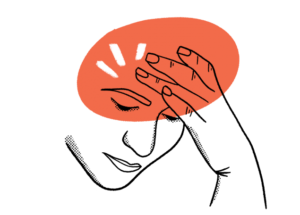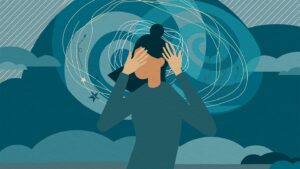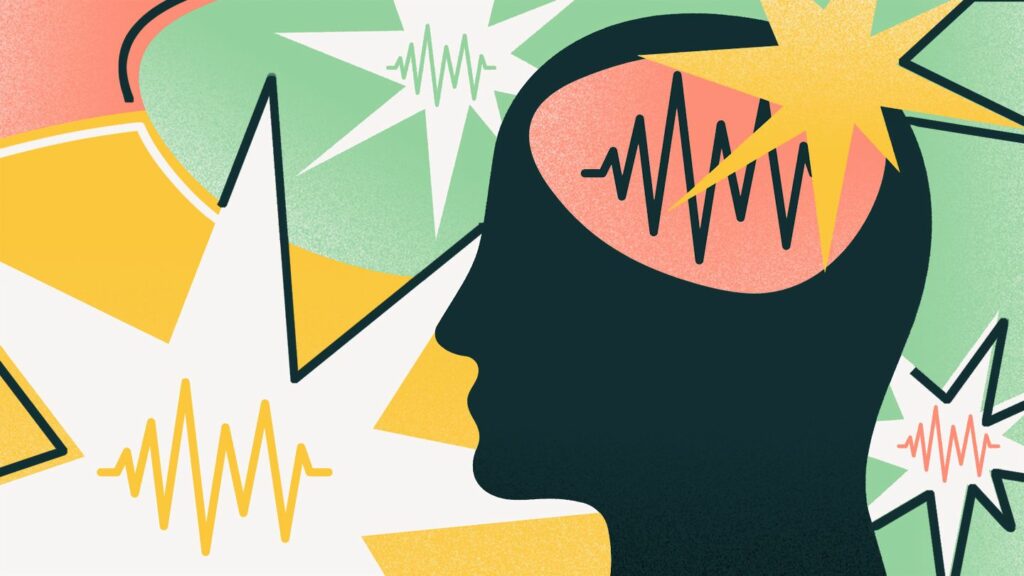Migraine and PTSD are two conditions that are often thought to be unrelated. However, a recent study has shown that there may be a link between the two disorders. The study found that people with migraine were more likely to also have PTSD. This is an important discovery, as it could lead to better treatment options for both conditions. If you suffer from migraine or PTSD, it is important to see a doctor who can help you get the best treatment possible.
Contents
Defining PTSD
PTSD, a common abbreviation for post-traumatic stress disorder, is a psychiatric disorder that may develop after a person is exposed to a traumatic event. PTSD can cause a variety of symptoms, including flashbacks, nightmares, anxiety, and depression. It is typically common in people who have faced exposure to combat, natural disasters, or sexual assault. However, anyone who has experienced a traumatic event can develop PTSD.
It is important to note that PTSD is not the same as post-concussion syndrome. Post-concussion syndrome is a condition that may develop after a person suffers a concussion. While both PTSD and post-concussion syndrome can cause similar symptoms, they are two different conditions.
Defining Migraine
Migraines are a type of headache that can cause a variety of symptoms. These symptoms may include nausea, vomiting, sensitivity to light and sound, and severe pain. Migraines are often recurring, and they can last for hours or even days. Some people with migraines only experience a few per year, while others may have them more frequently.
Migraineurs, as they are sometimes called, often have other health conditions as well. These conditions may include depression, anxiety, bipolar disorder, and sleep disorders. It is not currently known why migraines and these other conditions so often go hand-in-hand.
The Link Between PTSD and Migraine

While the link between PTSD and migraine is not yet fully understood, the recent study provides some insight. The study found that people with migraine were more likely to also have PTSD. This is an important discovery, as it could lead to better treatment options for both conditions.
There are a few possible explanations for the link between PTSD and migraine.
- One possibility is that the two conditions share a common cause. For example, exposure to trauma may increase the risk of developing both PTSD and migraines. Another possibility is that PTSD can trigger migraines or make them worse. This is because stress is a known trigger for migraines.
- It is also worth noting that the link between PTSD and migraine may be due to other factors, such as genetic predisposition or comorbidity with other disorders. More research is needed to determine the exact relationship between the two conditions.
- Gender also plays a role in the impact of migraines. The study found that women were more likely to suffer from both PTSD and migraines than men. This is likely due to the fact that women are more likely to experience trauma, such as sexual assault.
- It is also a belief that the mental, emotional and cognitive symptoms of PTSD can lead to physical pain and migraines. This may be due to the fact that people with PTSD often have a hard time coping with their symptoms. As a result, they may experience chronic stress and tension, which can lead to migraines.
- Other studies suggest that people with PTSD are more likely to self-medicate with drugs or alcohol. This can lead to a number of problems, including migraines. People who self-medicate are also at a higher risk of developing other health conditions as well.
Signs And Symptoms

PTSD and migraines can both cause a variety of symptoms. Sometimes these symptoms may overlap as the physical and cognitive are the similar. It is important to be aware of these symptoms so that you can seek help if you are suffering from either condition.
Some common symptoms of PTSD include:
- flashbacks
- nightmares
- intrusive thoughts
- avoidance of triggers
- changes in mood and behavior
- hypervigilance
- insomnia
Migraines can also cause a number of symptoms, including:
- severe pain
- nausea
- vomiting
- sensitivity to light and sound
- aura
- fatigue
Visual disturbances, such as aura, may also occur before or during a migraine. These visual disturbances can take the form of flashing lights, zigzag lines, or temporary blindness.
If you are suffering from any of these symptoms, it is important to seek help from a mental health professional. They can provide you with the support and resources you need to manage your condition.
Impacts Of PTSD And Migraine

Both of these conditions can have severe side effects. If left untreated, they can lead to a number of problems. These problems may include:
- Chronic pain: Due to the nature of these conditions, people who suffer from PTSD or migraines often experience chronic pain. This can lead to a number of problems, such as difficulty sleeping, fatigue, and depression.
- Impact on relationships: These conditions can also take a toll on your personal relationships. The symptoms of PTSD and migraines can make it difficult to maintain close relationships. In some cases, people may even avoid social interactions altogether.
- Physical and mental illnesses: PTSD and migraines can also lead to other physical and mental illnesses. These may include:
-Depression
Other kinds of physical pain: In addition to migraines, people with PTSD may also suffer from other kinds of physical pain, such as:
-Headaches
-Joint pain
-Stomach pain
- Decreased quality of life: When left untreated, these conditions can significantly reduce your quality of life. This is due to the fact that they can cause a great deal of pain and suffering.
- Difficulty functioning at work or school: These conditions can also make it difficult to function at work or school. This is because the symptoms can interfere with your ability to concentrate or perform tasks.
- Suicide: In severe cases, these conditions can lead to suicidal thoughts or attempts. This may be due to the fact that people with these conditions often feel hopeless and helpless. The pain and suffering caused by these conditions can be too much to bear
The bottom line is that both PTSD and migraines can have a significant impact on your life. If you are suffering from either condition, it is important to seek help from a mental health professional. With proper treatment, you can manage your symptoms and live a healthy, productive life.
Treatment Options

Fortunately, there are a number of treatment options available for both PTSD and migraines. These may include either self help strategies or help from a medical professional.
For Migraines
Migraines are treatable with both medication and self-help strategies. If you are suffering from migraines, your doctor may prescribe you medication to help relieve your symptoms. These may include:
- Pain relievers: These can help to reduce the pain of migraines.
- Anti-nausea medication: This can help to relieve the nausea and vomiting associated with migraines.
- Triptans: These are a type of medication that can help to stop migraines.
In addition, there are a number of self-help strategies that can be effective in managing migraines. These may include:
- Stress management: Learning how to manage stress can be helpful in reducing the frequency and severity of migraines. There are a number of different stress management techniques that you can try, such as relaxation therapy, yoga, or meditation.
- Avoiding triggers: If you know what triggers your migraines, it is important to avoid them. Common triggers include stress, bright lights, and loud noises.
- Getting enough sleep: It is important to get enough sleep if you suffer from migraines. This is because fatigue is a common trigger for migraines. An average of 8 hours sleep is recommended.
- Dietary changes: Making certain dietary changes can also be helpful in managing migraines. For example, including more magnesium-rich foods in your diet, such as dark leafy greens, can help to reduce the frequency of migraines. You may also want to avoid foods that are known to trigger migraines, such as aged cheese and red wine.
- Exercise: Getting regular exercise can also help reduce the severity of migraines. Exercise can help to improve your overall mood and increase your pain tolerance.
For PTSD
PTSD is a more complicated condition than migraines, and as such, it requires more specialized treatment. Treatment for PTSD may include both medication and therapy. If you are suffering from PTSD, your doctor may prescribe you medication to help relieve your symptoms. In addition, you will likely need to see a therapist on a regular basis. There are a number of different types of therapy that can be helpful in treating PTSD, such as:
- Cognitive behavioral therapy (CBT): This type of therapy helps people identify and change negative thinking patterns. This can be helpful in reducing the symptoms of PTSD.
- Exposure therapy: This type of therapy helps people confront their fears. This can be helpful in reducing the symptoms of PTSD. This involves gradually exposing yourself to the thing that you are afraid of.
- Eye movement desensitization and reprocessing (EMDR): This type of therapy helps people process and make sense of their trauma. This can be helpful in reducing the symptoms of PTSD. It works by having the person move their eyes back and forth while thinking about their trauma.
- Medications: There are a number of medications that can help treat the symptoms of PTSD. These may include antidepressants, anti-anxiety medications, or antipsychotics.
The bottom line is that both PTSD and migraines are serious conditions that can have a significant impact on your life. If you are suffering from either condition, it is important to seek help from a mental health professional. With proper treatment, you can manage your symptoms and live a healthy, productive life.
Conclusion
In conclusion of the above, it is evident that both migraines and PTSD can be debilitating conditions. However, it is important to seek help if you are suffering from either condition. Don’t suffer in silence, consult a healthcare provider for consultation and treatment. Remember that you’re not alone; there is help available, and things can get better.
If you are searching options for seeking professional help for PTSD or any other mental health condition, consider availing Mantra Care’s services. We have a team of highly professional mental health consultants providing the best quality psychological guidance and treatment. Our therapy sessions are available globally at affordable rates with ensured confidentiality. Reach out today to book a session or download our free Android or iOS app for more information!


